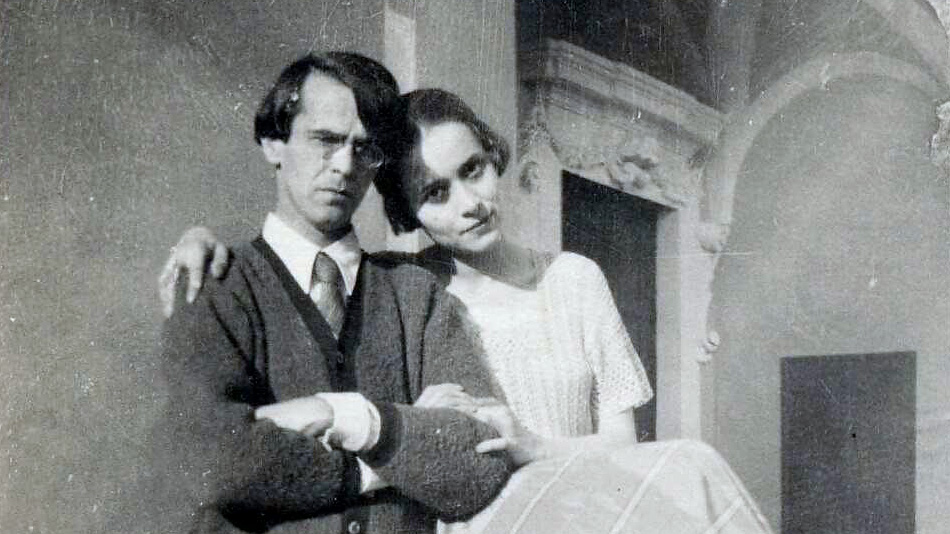testimonia

Vladislav Khodasevich and Nina Berberova, Sorrento, 1925.
We perceived everything that happened then as an omen. But of what?
It is difficult to know how to start thinking about Necropolis. Before I finished the book, I was certainly inclined to be dismissive – just so much gossip about people I’d never heard of, who happened to be behaving badly. That I did not (and do not) know much about the Silver Age of Russian poetry did not help. Certainly, a few names were familiar, such as Bely, Blok, Gorky – even Gumilyov peeking from behind Akhmatova’s skirts. Others meant nothing to me (Muni, Gershenzon) or almost nothing – like Bryusov, who was only familiar because Yerevan State University, where the more ambitious of the students from Goris went, is named after him.
It was tempting, then, to think little of Necropolis, to point out a few funny passages (as when Mandelstam showed up at Gumilyov’s revival of the Petersburg Poets’ Guild only to ‘drink the tea and eat the sweets’ [106]), and leave it at that. 1 The first three sections, in particular, seemed to be in a secret language, excluding rather than enlightening:
Our endless discussions, which touched upon an endless number of topics, gave rise to our own peculiar language consisting of quotations, allusions, and terms that were established gradually over time. We could understand each other from the slightest allusions; other people couldn’t understand us at all – and were offended by it. But at times it felt as though we had lost our ability to speak in a generally accepted language. I must admit that other people probably found our company rather insufferable. (88–9)
Indeed, Khodasevich makes fun of this sort thing when he recounts how Bely, running a bit mad in Berlin, would ride the U-Bahn, ‘conducting himself entirely à la Prutkov: whispering the Russian words, which were incomprehensible to the people around us, into my ear and shouting out the German ones for the whole wagon to hear’ (72). Despite this, the book is engaging, and there is something to gain from listening in on this secret language, trying to decipher if not the meaning, at least a meaning. It is, after all, a book of ideas, so there is a thread to follow, even if it remains hopelessly tangled for this particular reader.
At first, it helped to view each section in terms of its prevailing mood. The section on Bryusov, for instance, is marked by contempt – the sneer of disdain for the man and everything he did in literature (his poetry ultimately dismissed by its increasing reliance on mechanical formulae to the detriment of meaning) and life (an egregious bully) is present throughout. Using this clew, 2 the other sections yielded a sort of sense, ranging from pity (‘The Death of Renate’) to enlightened bafflement (on Bely) to affection (Gershenzon). The sections on Yesenin (a bit of a poser) or Blok and Gumilyov left a more subtle impression, either because of the greater distance of the relationship or the lack (or perhaps presence?) of stronger feelings.
Although the subjects were dead by the time Khodasevich wrote about them (it is, as the title makes clear, a gathering of the dead), these are not eulogies; in some cases the memoir was a chance to get the last word, but in others it was a reckoning – perhaps with men he did not imagine he would outlive. They are not arranged chronologically, either by death of the subject or composition, but they form an uneasy, melancholy sort of narrative. What, after all, does one say about one’s friends, one’s acquaintances, one’s nemeses when they are gone?
In the final section Khodasevich presents one of his contemporaries reacting to part of Necropolis, as Gorky (a profoundly critical reader, who approached even the daily newspaper with a photographic memory and a red pencil [202f.]) reads the memoir of Bryusov:
‘What you’ve written is harsh, but – magnificent. When I die, please write something about me.’
‘All right, Alexei Maximovich.’
‘You won’t forget?’
‘I won’t forget.’
- Nabokov’s impish picture in Speak, Memory of a poet who ‘never rises from the hard chair on which he sits, his thin legs crossed, his eyes glittering with malevolence and wit […] the perfect frankness he indulged in when voicing his dislikes made him some terrible enemies among the most powerful critical coteries’ (275) does not necessarily inspire one to look too closely.[↩]
- I remember learning this word from Great Expectations, when I first thought it was a typographical error. Thus one learns.[↩]
